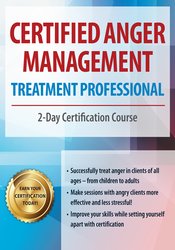Description
Working with angry clients can make sessions uncomfortable, stressful and anxiety inducing.
But all clinicians will encounter anger, whether it’s the focus of your practice, or something that arises as you help clients with trauma, anxiety, depression, shame, addiction and other issues.
This Certification Course recording will give you the skills and clinical tools you need to confidently and effectively work with angry clients and fundamentally change their destructive relationship with anger.
Watch and get proven strategies that derail anger in the moment, challenge dysfunctional thoughts, and help clients let go of anger rooted in the past. You’ll also get detailed guidance on how to teach your clients the skills they need to constructively communicate anger without the outbursts that damage their most important relationships, jeopardize their careers, and put their health at risk.
Better still, you’ll leave this Certification Course recording having met the full educational requirements to become a Certified Anger Management Treatment Professional (AMTP), setting yourself apart from others in your field, and letting those you work with know that you’ve invested the time and effort necessary to provide treatment at the highest level!
Become a Certified Anger Management Treatment Professional through the IATP (www.traumapro.net).
Three steps to becoming a Certified Anger Management Treatment Professional (AMTP):
- Complete this training recording
- Pay the $99.99 certification charge at the IATP website (www.traumapro.net)
- Submit CPD Certificate from Step 1 and Professional License to info@traumapro.net.
CPD
CPD
This online program is worth 11.75 hours CPD.
Speaker
Dr. Jeff Peterson is a Licensed Independent Mental Health Counselor, a National Board-Certified Counselor, a Clinical Supervisor, and an Assistant Professor in the School of Education and Counseling at Wayne State College in Wayne, Nebraska. Prior to this, he operated two very successful clinical practices, Denver Psychotherapy in Denver, Colorado and Kansas City Psychotherapy in Kansas City, Missouri. He also taught at the University of Colorado in Colorado Springs, Colorado; Argosy University in Denver, Colorado; Avila University in Kansas City, Missouri; and Northwestern University in Evanston, Illinois.
Over the past decade Dr. Peterson served as a faculty mentor for the QUAD Innovation Alliance, a joint-university collaboration between the United States Air Force Academy and the University of Colorado, developing best-practices for in-school suicide prevention, intervention, and treatment planning. Throughout his career he has been heavily involved in promoting multicultural inclusivity within the classroom and community.
Dr. Peterson was the co-founder and organizer of the Healthcare Guild, which has now merged with the Outcare Health – https://www.outcarehealth.org/, a national non-profit organization dedicated to helping sexual and gender minorities find affirming and culturally competent health care. He also continues to serve on the editorial review board for the American Counseling Association’s Journal of LGBT Issues in Counseling and as a faculty advisor for Chi Sigma Iota Graduate Counseling Honor Society, which focuses on promoting the development of future leaders in the field of clinical mental health counseling.
Dr. Peterson’s research utilizes relational cultural theory, which centers on the importance of developing positive growth-fostering relationships. He helps clinicians and educators develop positive and dynamic multicultural learning experiences in both their classrooms and clinical practice. This includes advocating for a more inclusive environment by addressing issues surrounding aversion, shame, anger, racism, sexism, and heterosexism. Most recently, Dr. Peterson has been a strong advocate for incorporating more Self-Care training as part of the CACREP-Accredited clinical mental health counselor core curriculum.
Speaker Disclosures:
Financial: Jeff Peterson maintains a private practice and has employment relationships Wayne State College. He receives a speaking honorarium and recording royalties from PESI, Inc. He has no relevant financial relationships with ineligible organizations.
Non-financial: Jeff Peterson is a member of the National Board of Certified Counselors, American Psychological Association, and American Counseling Association.
Objectives
- Analyze the neurobiology of anger and catalogue the brain regions involved in processing anger.
- Differentiate between the phases of the anger cycle and communicate how this informs clinical practice.
- Evaluate current trends in managing anger in substance abuse treatment.
- Inspect the connection between anger, violence and abuse.
- Characterize how clients’ can be taught to identify triggers so they can choose an appropriate response strategy.
- Use in-session mindfulness-based strategies to engage reluctant and treatment-resistant clients.
- Manage responses to dysfunctional thoughts and judgmental beliefs with skills that effectively intervene in these processes.
- Reduce the body’s anger response with mindfulness training and diaphragmatic breathing techniques that diminish the body’s fight-or-flight response.
- Teach clients how to communicate anger constructively with assertiveness techniques.
- Develop clients’ emotional vocabulary to help them handle conflict without aggression.
- Conduct a cost-benefit analysis intervention to demonstrate the impact of “old anger” on clients’ lives.
- Employ clinical strategies that help avoid automatic defensiveness in clients and allow you to work safely with aggressive personalities.
Outline
The Neuroscience of the Angry Brain
- Anger systems in the brain
- The fight-flight-freeze response of anger
- Connections between the frontal and temporoparietal region
- How breathing affects the survival brain
- Why fighting/hiding anger doesn’t work
Anger and Co-Occurring Disorders: Trauma, Addiction, Depression and More
- The relationship between anger and addiction
- Intermittent Explosive Disorder
- ODD
- Bipolar Disorder
- When anxiety presents as anger
- The role of anger in depression
- Anger after trauma
Shame, Fear, Guilt and the Underlying Causes of Anger
- Avoidance, shame, fear and guilt
- The connection between anger and grief
- The cycle of anger
- How anger styles inform your clinical approach
- Masked anger
- Explosive anger
- Chronic anger
- Passive aggressive
The Intersection of Anger and Abuse
- Assessment of violence potential
- Is domestic abuse an anger management problem?
- Controlling others
Case Conceptualization and Treatment Planning
- Create a safe therapeutic environment
- Build emotional vocabulary
- Establish short-term and long-term goals
- Strategies for working with groups
Teach Clients to Identify Anger Triggers
- How to use anger logs with clients
- Monitoring physiological sensations of anger
- Identify words and actions that escalate
- Practical goals and commitment to change
- Assessing for client strengths
Mindfulness and Relaxation Techniques To Derail Anger in the Moment
- Reset anger with breath work
- Progressive muscle relaxation techniques to maintain control
- Mindful anger techniques and choice awareness
- Guided imagery to put clients in charge of anger
- The Lifesaver Technique
Cognitive Approaches to Challenge the Dysfunctional Thoughts Behind Anger
- CBT exercises to reduce negative self-talk
- Cognitive restructuring and defusion from judgmental thoughts
- Problem-solving and hypothetical situation training
- Creative thought stopping tools for emotional regulation
- Distraction and disengagement strategies
Therapeutic Strategies to Release Old Anger and Lingering Resentments
- Anger and identity
- The cost of avoidance
- Why forgiveness (and self-forgiveness) is never easy
- Prerequisites to letting go of the past
- Conduct a cost-benefit analysis intervention
- Forgiveness interventions to “turn off” resentment
Teach Clients to Constructively Communicate Anger
- Assertiveness training techniques
- Communicate anger effectively with “I” statements
- The active role of acceptance
- Mindfully respond to anger in interpersonal relationships
- Defuse anger with humor and other conflict resolution strategies
Anger Management Strategies for Kids and Adolescents
- How anger escalates in kids
- Normalizing anger as a healthy emotion
- Communication skills to alleviate frustration
- Coping skills for stress and anxiety
- Feelings thermometer – connect feelings to coping skills
Anger Management for Relationships
- When mundane resentments spiral out of control
- Interventions to overcome the blame habit
- Teach clients active listening skills
- Strategies to build emotional intelligence in couples
Risks and Limitations of Anger Management Therapy
Target Audience
- Counselors
- Social Workers
- Psychologists
- Marriage and Family Therapists
- Addiction Counselors
- Case Managers
- Therapists
- Nurses
- Other Mental Health Professionals
- School Counselors
- School Psychologists
- School Social Workers
Reviews
Overall:
5
Total Reviews: 3


 Online CourseFrank Anderson’s Master Class in Internal Family Systems Therapy£129.98£999.98Frank Anderson’s Master Class in Internal Family Systems Therapy29 Jan, 2024Frank Anderson’s Master Class in Internal Family Systems Therapy£129.98£999.98 value
Online CourseFrank Anderson’s Master Class in Internal Family Systems Therapy£129.98£999.98Frank Anderson’s Master Class in Internal Family Systems Therapy29 Jan, 2024Frank Anderson’s Master Class in Internal Family Systems Therapy£129.98£999.98 value Online CourseDr Laurel Parnell’s Attachment-Focused EMDR Skills and Supervision Group£495.00£1,590.00Dr Laurel Parnell’s Attachment-Focused EMDR Skills and Supervision Group14 Jan, 2025Dr Laurel Parnell’s Attachment-Focused EMDR Skills and Supervision Group£495.00£1,590.00 value
Online CourseDr Laurel Parnell’s Attachment-Focused EMDR Skills and Supervision Group£495.00£1,590.00Dr Laurel Parnell’s Attachment-Focused EMDR Skills and Supervision Group14 Jan, 2025Dr Laurel Parnell’s Attachment-Focused EMDR Skills and Supervision Group£495.00£1,590.00 value BookWritten by three leading experts in the fields of disordered eating, mental health, and trauma-informed care, this book will become your go-to guide for learning how to reject diet culture, heal your£18.99Written by three leading experts in the fields of disordered eating, mental health, and trauma-informed care, this book will become your go-to guide for learning how to reject diet culture, heal your20 Feb, 2024Written by three leading experts in the fields of disordered eating, mental health, and trauma-informed care, this book will become your go-to guide for learning how to reject diet culture, heal your£18.99
BookWritten by three leading experts in the fields of disordered eating, mental health, and trauma-informed care, this book will become your go-to guide for learning how to reject diet culture, heal your£18.99Written by three leading experts in the fields of disordered eating, mental health, and trauma-informed care, this book will become your go-to guide for learning how to reject diet culture, heal your20 Feb, 2024Written by three leading experts in the fields of disordered eating, mental health, and trauma-informed care, this book will become your go-to guide for learning how to reject diet culture, heal your£18.99 Online CourseCBT-I To Treat Insomnia: Proven Interventions That Go Beyond Sleep Hygiene£0.00£149.00CBT-I To Treat Insomnia: Proven Interventions That Go Beyond Sleep Hygiene12 Dec, 2024CBT-I To Treat Insomnia: Proven Interventions That Go Beyond Sleep Hygiene£0.00£149.00 value
Online CourseCBT-I To Treat Insomnia: Proven Interventions That Go Beyond Sleep Hygiene£0.00£149.00CBT-I To Treat Insomnia: Proven Interventions That Go Beyond Sleep Hygiene12 Dec, 2024CBT-I To Treat Insomnia: Proven Interventions That Go Beyond Sleep Hygiene£0.00£149.00 value













